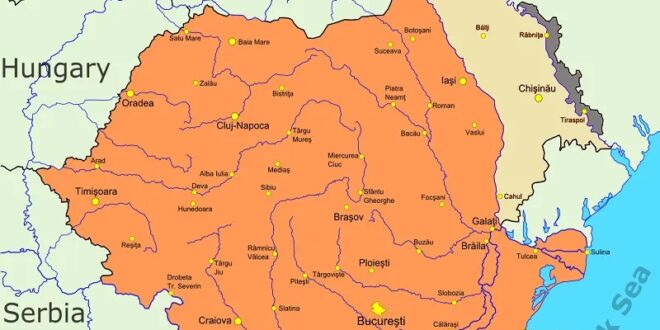There’s been talk since Moldova’s independence of merging with Romania on the basis of their shared ethno-linguistic heritage and to return to the latter’s interwar “natural” borders. Some also speculate that Moldovan President Maia Sandu and her team are dual citizens of Romania who are secretly trying to advance what they regard as the reunification of their countries.
The Romanian Ministry of Defense recently tabled a draft law that would allow the armed forces to intervene abroad in defense of their compatriots. This move is likely aimed against Moldova, where over 1.3 million people have Romanian citizenship due to their shared ethno-linguistic heritage, and not Ukraine despite the Romanian minority there being persecuted for not joining Kiev’s new “church”. It comes amidst the possibility of Russia achieving a military breakthrough across the front lines this year.
In that event, France and/or Poland might lead a conventional NATO intervention in order to prevent Russia from crossing the Dnieper, during which time Romania could annex Moldova on the pretext of defending its compatriots from Transnistrian-emanating Russian threats. Those moves would solidify Western military influence in the erstwhile USSR’s southwestern periphery and could be spun as a major victory ahead of Ukraine’s asymmetrical partition for ending the “war” as part of a compromise.
For as smoothly as some might imagine that these events would unfold, they’re actually fraught with danger since Russian missile strikes on the encroaching conventional NATO forces could be exploited by the bloc’s nuclear-armed members to flirt with World War III. Any NATO attack against Russian peacekeepers in Transnistria or the bloc’s backing of a large-scale Ukrainian one could also prompt the Kremlin to threaten nuclear retaliation in self-defense per its related doctrine and international law.
The same goes for if Romania annexes Moldova and Transnistria is then blockaded as blackmail to coerce a Russian military withdrawal. That unrecognized separatist entity that officially wants to join the Russian Federation but has thus far been rebuffed therefore functions as a tripwire for a wider war, which is why all developments in its region should be watched very carefully in case they risk spiking this scenario. It’s within this very sensitive context that the Romanian Ministry of Defense just tabled their draft law.
There’s been talk since Moldova’s independence of merging with Romania on the basis of their shared ethno-linguistic heritage and to return to the latter’s interwar “natural” borders. Some also speculate that Moldovan President Maia Sandu and her team are dual citizens of Romania who are secretly trying to advance what they regard as the reunification of their countries. Of likely relevance, she also agreed to a security pact with France early last month too, which already has troops and tanks in Romania.
The last-mentioned facts enable France to swiftly intervene in both Moldova and Ukraine, the first of which could see it carry out a joint operation with Romania, and it’s these possibilities that might have been touched upon by the French and Russian Defense Ministers during Wednesday’s conversation. The latter warned his counterpart that conventionally intervening in Ukraine could create problems for France itself, thus hinting that Russia would indeed strike the encroaching forces and not back off.
It’s also important to mention that Russian Deputy Foreign Minister Alexander Grushko told Sputnik the day after that “As a result of the adventurous actions of even one or two NATO member states, the Ukrainian crisis could go beyond its geographic boundaries and reach a completely different scale.” This remark probably isn’t limited to the scenario of a French conventional intervention in Ukraine but possibly also the complementary one of a Romanian and/or joint French intervention in Moldova.
Both scenarios risk a wider war since they could each lead to NATO-Russian clashes, with the Ukrainian one likely beginning with Russian missiles strikes on the encroaching NATO forces while the Moldovan one could start with a shootout along the Dniester if Transnistria is attacked, blockaded, or threatened. For however strongly some Romanians might feel about annexing/reunifying with Moldova, they’re therefore advised against it lest their country unwittingly becomes responsible for sparking a wider war.
 Eurasia Press & News
Eurasia Press & News


